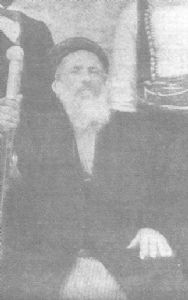A Short Tribute
Hacham Yaakov Douek Hacohen was born to Kammar and Hacham Shaul in 1838 in Aleppo, Syria. He learned Torah from his father and from Hacham Mordecai Abadi. His mother was also known to be learned in Bible and Talmud. In 1859, Hacham Yaakov Douek Hacohen married Girz, daughter of Hacham Moshe Sweid.
He first earned a living teaching Talmud to wealthy students, and then began to officiate as rabbi of the Kilis village (currently in Turkey), near Aleppo. When the Hacham Bashi of Aleppo died, Hacham Yaakov Douek Hacohen was invited to fill the position, and officiated in this role for many years. Towards the end of his life, he chose to leave the position and was replaced by Hacham Hizkyahu Shabetai. He was then appointed president of the rabbinic courts, and remained in this position to the end of his life.
Hacham Yaakov Douek Hacohen was an excellent preacher who held a deep influence on his public. Although he testified that he did not enjoy preaching to the public, he acquiesced to the community's insistence and preached regularly. His books are based largely on his sermons.
Hacham Yaakov Douek Hacohen visited the Land of Israel in 1877 for a pilgrimage to tombs of tzaddikim. During his visit, he met with Rishon LeZion Hacham Abraham Ashkenazi and requested his approbation for one of his books.
In the introduction to his book, Derech Emunah, Hacham Yaakov Douek Hacohen recounts the hardships he faced during his life. He tells of the decease of his three wives, the loss of two of his children, the hardship caused by his poverty and of his attempts to have his books published.
Hacham Yaakov Douek Hacohen passed away on 2 Sivan, 5679 and was buried in his city, Aleppo.
Hacham Yaakov Douek Hacohen authored several books, some of which remain in manuscript form and two of which were published: Derech Emunah – sayings on ethics, written in alphabetical order, and She'erit Yaakov – sermons for the four Sabbaths, which includes a booklet entitled Mishkenot David that contains sermons eulogizing his teacher, Hacham Mordecai Abadi, and several sermons by his sons.
